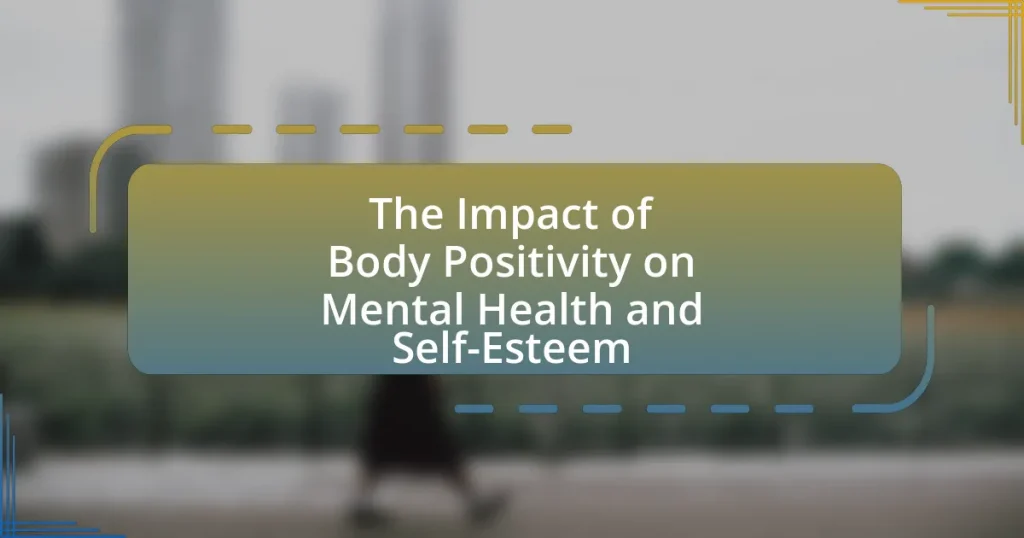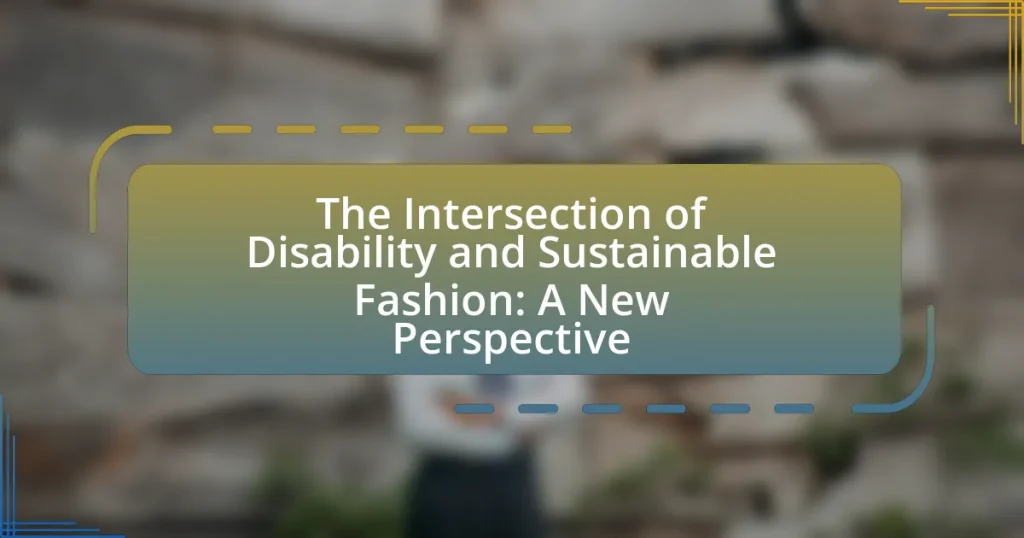The article examines the impact of body positivity on mental health and self-esteem, highlighting its role in promoting acceptance of diverse body types and reducing appearance-related stigma. Research indicates that individuals who embrace body positivity experience lower levels of anxiety and depression, higher self-esteem, and greater life satisfaction. The article discusses the psychological benefits associated with body positivity, including improved self-acceptance and emotional resilience, as well as the challenges faced by the movement, such as societal stigma and commercialization. Additionally, it explores practical steps individuals can take to foster body positivity and its influence on healthier lifestyle choices.
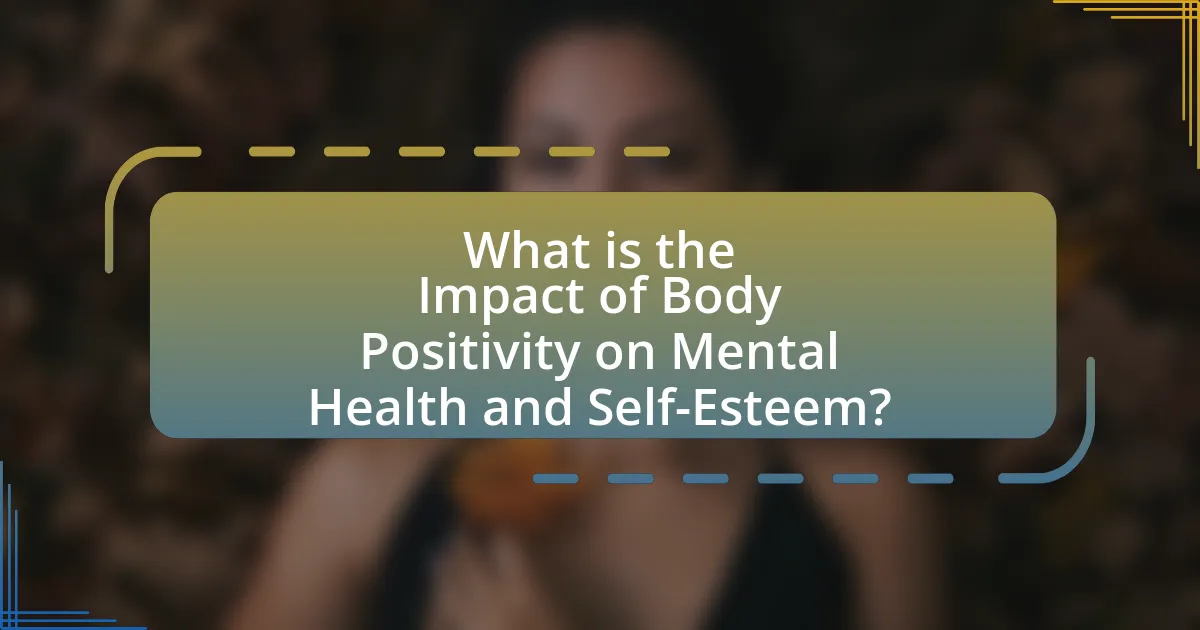
What is the Impact of Body Positivity on Mental Health and Self-Esteem?
Body positivity significantly enhances mental health and self-esteem by promoting acceptance of diverse body types and reducing stigma associated with appearance. Research indicates that individuals who embrace body positivity experience lower levels of anxiety and depression, as they are less likely to engage in negative self-talk and body shaming. A study published in the journal Body Image found that participants who practiced body positivity reported higher self-esteem and greater life satisfaction compared to those who adhered to traditional beauty standards. This shift in mindset fosters resilience against societal pressures, leading to improved overall mental well-being.
How does body positivity influence mental health?
Body positivity significantly enhances mental health by promoting self-acceptance and reducing negative body image. Individuals who embrace body positivity often experience lower levels of anxiety and depression, as they cultivate a more compassionate relationship with their bodies. Research published in the journal “Body Image” by Tylka and Wood-Barcalow (2015) indicates that body positivity is linked to higher self-esteem and overall well-being. This positive mindset helps individuals resist societal pressures and unrealistic beauty standards, leading to improved mental health outcomes.
What psychological benefits are associated with body positivity?
Body positivity is associated with several psychological benefits, including improved self-esteem, reduced anxiety, and enhanced overall mental well-being. Research indicates that individuals who embrace body positivity experience a greater sense of self-acceptance, which correlates with lower levels of depression and anxiety. A study published in the journal “Body Image” by Tylka and Wood-Barcalow (2015) found that body appreciation is linked to higher self-esteem and lower body dissatisfaction, demonstrating that positive body image can significantly enhance mental health. Furthermore, body positivity fosters resilience against societal pressures and negative body image messages, contributing to a healthier self-concept and emotional stability.
How does body positivity affect anxiety and depression levels?
Body positivity significantly reduces anxiety and depression levels by promoting self-acceptance and improving mental well-being. Research indicates that individuals who embrace body positivity experience lower rates of anxiety and depression due to enhanced self-esteem and reduced negative body image. A study published in the journal “Body Image” found that participants who engaged in body-positive practices reported a 30% decrease in anxiety symptoms and a 25% decrease in depressive symptoms over a six-month period. This correlation suggests that fostering a positive body image can lead to improved mental health outcomes.
In what ways does body positivity enhance self-esteem?
Body positivity enhances self-esteem by promoting acceptance of diverse body types and reducing negative self-perception. This acceptance fosters a healthier self-image, allowing individuals to appreciate their bodies for what they are rather than conforming to societal beauty standards. Research indicates that individuals who engage in body positivity practices report higher levels of self-worth and confidence. For instance, a study published in the journal “Body Image” by Tylka and Wood-Barcalow (2015) found that body appreciation is significantly linked to overall self-esteem, suggesting that embracing body diversity directly contributes to improved mental health outcomes.
What role does self-acceptance play in self-esteem?
Self-acceptance significantly enhances self-esteem by fostering a positive self-image and reducing self-criticism. When individuals embrace their true selves, including their flaws and strengths, they are more likely to develop a stable sense of worth. Research indicates that self-acceptance correlates with higher self-esteem levels, as individuals who accept themselves are less affected by external validation and societal pressures. A study published in the Journal of Happiness Studies found that self-acceptance is a strong predictor of self-esteem, highlighting its crucial role in mental well-being.
How does body positivity challenge societal beauty standards?
Body positivity challenges societal beauty standards by promoting the acceptance of diverse body types and rejecting the narrow definitions of beauty often perpetuated by media and culture. This movement encourages individuals to embrace their bodies as they are, fostering self-love and reducing the stigma associated with non-conforming appearances. Research indicates that body positivity can lead to improved mental health outcomes, as individuals who engage with this movement report higher self-esteem and lower levels of body dissatisfaction. For example, a study published in the journal “Body Image” found that participants who practiced body positivity experienced significant reductions in anxiety and depression related to body image.
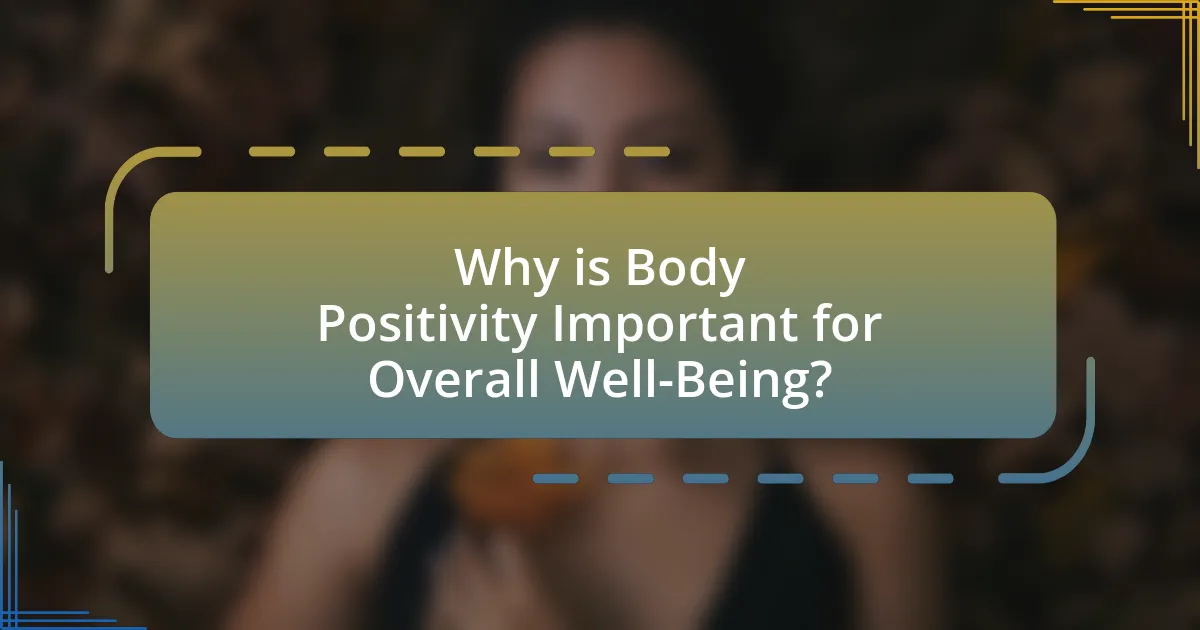
Why is Body Positivity Important for Overall Well-Being?
Body positivity is important for overall well-being because it fosters a healthier self-image and promotes mental health. When individuals embrace body positivity, they are less likely to experience negative emotions such as shame and anxiety related to their appearance. Research indicates that positive body image is linked to higher self-esteem and lower levels of depression. For instance, a study published in the journal Body Image by Tylka and Wood-Barcalow (2015) found that individuals who practice body positivity report greater life satisfaction and emotional well-being. This connection underscores the significance of body positivity in enhancing mental health and overall quality of life.
How does body positivity contribute to emotional resilience?
Body positivity contributes to emotional resilience by fostering a healthier self-image and reducing negative self-talk. When individuals embrace body positivity, they develop a greater acceptance of their physical appearance, which can lead to increased self-esteem and a more positive outlook on life. Research indicates that individuals who practice body positivity are less likely to experience anxiety and depression, as they are more resilient to societal pressures and unrealistic beauty standards. A study published in the journal Body Image found that body positivity interventions significantly improved participants’ emotional well-being and coping strategies, demonstrating a direct link between body acceptance and emotional resilience.
What are the long-term effects of embracing body positivity?
Embracing body positivity leads to improved mental health and enhanced self-esteem over the long term. Research indicates that individuals who adopt a body-positive mindset experience lower levels of anxiety and depression, as they cultivate self-acceptance and reduce negative self-talk. A study published in the journal “Body Image” found that participants who engaged in body-positive practices reported significantly higher self-esteem and life satisfaction compared to those who did not. Additionally, embracing body positivity fosters resilience against societal pressures and promotes healthier lifestyle choices, contributing to overall well-being.
How can body positivity lead to healthier lifestyle choices?
Body positivity can lead to healthier lifestyle choices by fostering a more accepting and supportive relationship with one’s body, which encourages individuals to prioritize their well-being. When people embrace body positivity, they often experience reduced stress and anxiety related to body image, which can motivate them to engage in physical activities and make healthier food choices without the pressure of societal standards. Research indicates that individuals who practice body positivity are more likely to participate in regular exercise and adopt balanced diets, as they focus on health rather than appearance. A study published in the journal “Body Image” found that body-positive attitudes correlate with higher levels of physical activity and healthier eating habits, demonstrating that acceptance of one’s body can directly influence lifestyle decisions.
What societal changes are driven by the body positivity movement?
The body positivity movement drives significant societal changes, including increased acceptance of diverse body types and a shift in beauty standards. This movement challenges traditional ideals of attractiveness, promoting the idea that all bodies are worthy of respect and love, regardless of size, shape, or appearance. Research indicates that this shift contributes to improved mental health outcomes, as individuals experience reduced body dissatisfaction and enhanced self-esteem. For instance, a study published in the journal “Body Image” found that exposure to body-positive messages can lead to a decrease in negative body image and an increase in overall well-being.
How does media representation impact body positivity?
Media representation significantly impacts body positivity by shaping societal standards of beauty and influencing individual self-perception. When diverse body types are portrayed positively in media, it fosters acceptance and encourages individuals to embrace their own bodies, leading to improved self-esteem and mental health. Conversely, narrow representations often perpetuate unrealistic beauty ideals, which can contribute to body dissatisfaction and negative mental health outcomes. Research indicates that exposure to body-positive media can enhance body image and reduce the prevalence of eating disorders, as evidenced by a study published in the journal “Body Image” by Tiggermann and Slater, which found that participants exposed to diverse body representations reported higher body satisfaction.
What initiatives promote body positivity in communities?
Initiatives that promote body positivity in communities include educational programs, social media campaigns, and community workshops. Educational programs in schools and organizations focus on teaching individuals about body diversity and self-acceptance, which can lead to improved mental health outcomes. Social media campaigns, such as the #BodyPositive movement, encourage individuals to share their stories and celebrate diverse body types, fostering a supportive online environment. Community workshops often provide safe spaces for discussions about body image, self-esteem, and mental health, helping participants build confidence and resilience. These initiatives collectively contribute to a culture of acceptance and support, which is essential for enhancing mental well-being and self-esteem.
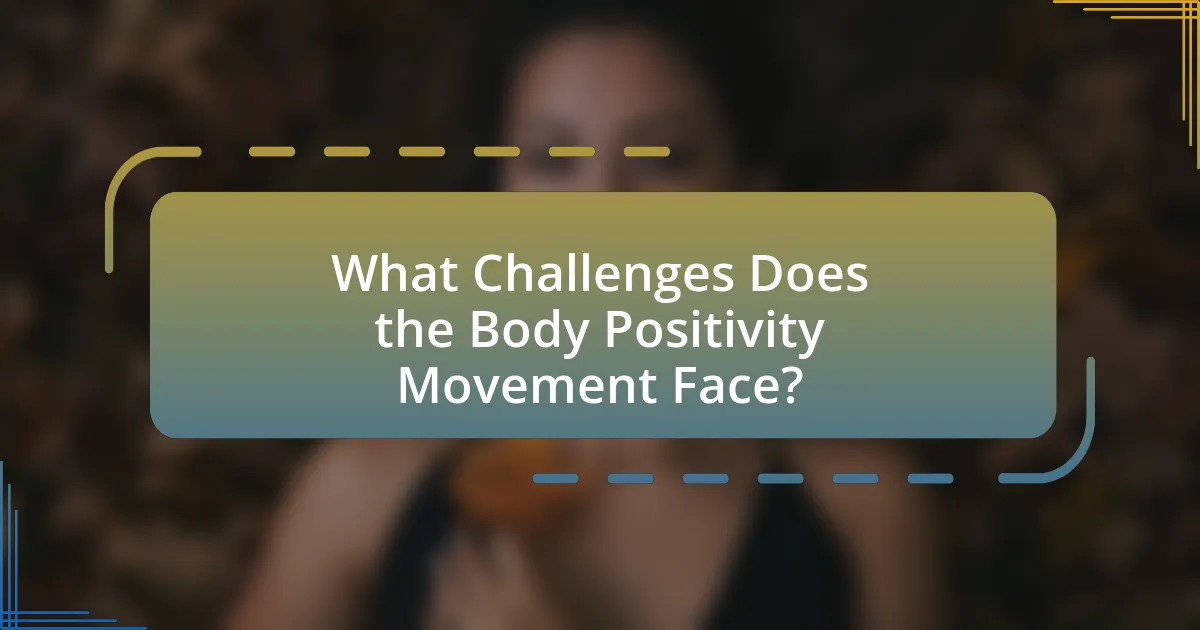
What Challenges Does the Body Positivity Movement Face?
The Body Positivity Movement faces significant challenges, including societal stigma, commercialization, and the intersectionality of body image issues. Societal stigma manifests through persistent negative stereotypes and discrimination against individuals with non-normative body types, which can undermine the movement’s goals. Commercialization often dilutes the original message of body acceptance, as brands may exploit the movement for profit without genuine commitment to inclusivity. Additionally, intersectionality highlights that individuals from marginalized communities experience unique body image struggles, complicating the movement’s effectiveness in addressing diverse needs. These challenges hinder the movement’s ability to foster widespread acceptance and improve mental health and self-esteem for all individuals.
How do negative societal perceptions hinder body positivity?
Negative societal perceptions hinder body positivity by perpetuating unrealistic beauty standards that individuals feel pressured to conform to. These perceptions often manifest through media representation, social norms, and peer influences, leading to feelings of inadequacy and low self-esteem among those who do not meet these standards. Research indicates that exposure to idealized body images can result in body dissatisfaction, which is linked to mental health issues such as anxiety and depression. For instance, a study published in the journal “Body Image” found that individuals who frequently engage with media portraying thin ideals report higher levels of body dissatisfaction and lower self-esteem. Thus, negative societal perceptions create an environment where body positivity struggles to thrive, as individuals internalize these harmful standards and experience adverse effects on their mental health.
What are common misconceptions about body positivity?
Common misconceptions about body positivity include the belief that it promotes unhealthy lifestyles or that it is solely about self-acceptance without any action. Body positivity actually encourages individuals to embrace their bodies while also advocating for health at every size, emphasizing that self-love can coexist with healthy habits. Research indicates that body positivity can lead to improved mental health outcomes, as it reduces feelings of shame and promotes self-esteem, countering the notion that it neglects health. Studies, such as those published in the journal “Body Image” by Tylka and Wood-Barcalow, demonstrate that body positivity fosters a more holistic approach to well-being, integrating both mental and physical health.
How can individuals combat stigma related to body image?
Individuals can combat stigma related to body image by promoting body positivity and fostering supportive environments. Engaging in open conversations about body image challenges helps to normalize diverse body types and reduces feelings of isolation. Research indicates that body positivity initiatives can lead to improved mental health outcomes, as seen in a study published in the journal “Body Image,” which found that individuals who participated in body positivity campaigns reported higher self-esteem and lower levels of body dissatisfaction. Additionally, surrounding oneself with supportive peers and consuming media that celebrates body diversity can further diminish stigma and enhance self-acceptance.
What strategies can support the body positivity movement?
Promoting inclusive representation in media is a key strategy that can support the body positivity movement. By showcasing diverse body types, skin tones, and abilities in advertising, television, and social media, the media can challenge societal beauty standards and foster acceptance. Research indicates that exposure to diverse representations can improve self-esteem and body image among individuals, as evidenced by a study published in the journal “Body Image,” which found that participants exposed to varied body types reported higher levels of body satisfaction. Additionally, educational programs that focus on self-acceptance and critical media literacy can empower individuals to resist negative societal messages about body image, further reinforcing the principles of body positivity.
How can social media be used positively to promote body positivity?
Social media can be used positively to promote body positivity by creating inclusive communities that celebrate diverse body types and challenge societal beauty standards. Platforms like Instagram and TikTok allow users to share personal stories, images, and messages that encourage self-acceptance and appreciation for all body shapes. Research indicates that exposure to body-positive content can lead to improved self-esteem and reduced body dissatisfaction among individuals, particularly young people. For instance, a study published in the journal “Body Image” found that participants who engaged with body-positive social media content reported higher levels of body satisfaction and lower levels of disordered eating behaviors.
What role do educational programs play in fostering body positivity?
Educational programs play a crucial role in fostering body positivity by providing individuals with knowledge and tools to challenge societal beauty standards. These programs often include curricula that promote self-acceptance, critical thinking about media representations, and discussions on the diversity of body types. Research indicates that educational interventions can significantly improve body image and self-esteem; for instance, a study published in the Journal of Adolescent Health found that participants in body positivity workshops reported increased self-acceptance and reduced body dissatisfaction. By equipping individuals with the understanding that beauty is subjective and diverse, educational programs contribute to a healthier mental outlook and enhanced self-esteem.
What practical steps can individuals take to embrace body positivity?
Individuals can embrace body positivity by practicing self-acceptance and challenging negative thoughts about their bodies. Engaging in positive self-talk helps to counteract societal pressures and unrealistic beauty standards. Research indicates that individuals who focus on their strengths and qualities beyond appearance report higher self-esteem and improved mental health. Additionally, surrounding oneself with supportive and body-positive communities fosters an environment that encourages acceptance and appreciation of diverse body types. Studies show that social support plays a crucial role in enhancing body image and overall well-being.
How can daily affirmations improve self-esteem and body image?
Daily affirmations can significantly improve self-esteem and body image by promoting positive self-perception and reducing negative thoughts. Research indicates that regularly practicing affirmations can lead to increased self-acceptance and a more favorable view of one’s body. A study published in the journal “Psychological Science” by Cohen and Sherman (2014) found that self-affirmation can buffer against the effects of stress and enhance overall well-being. This process helps individuals challenge and reframe negative beliefs about themselves, fostering a healthier self-image and greater confidence.
What activities promote a positive body image and mental health?
Engaging in physical activities, practicing mindfulness, and fostering social connections promote a positive body image and mental health. Regular exercise, such as yoga or team sports, enhances self-esteem and body satisfaction by releasing endorphins and improving physical fitness. Mindfulness practices, including meditation and deep-breathing exercises, help individuals develop a more compassionate view of their bodies and reduce negative self-talk. Additionally, building supportive social networks through friendships and community involvement can reinforce positive body image by providing affirmation and reducing feelings of isolation. Research indicates that individuals who participate in these activities report higher levels of body satisfaction and lower levels of anxiety and depression, demonstrating the interconnectedness of body positivity and mental well-being.









